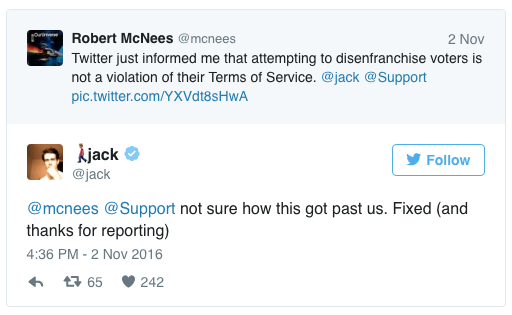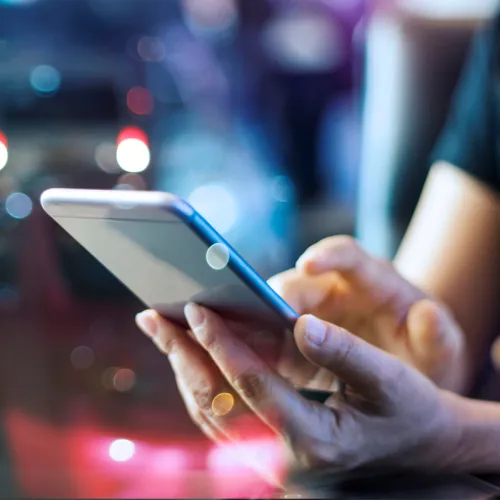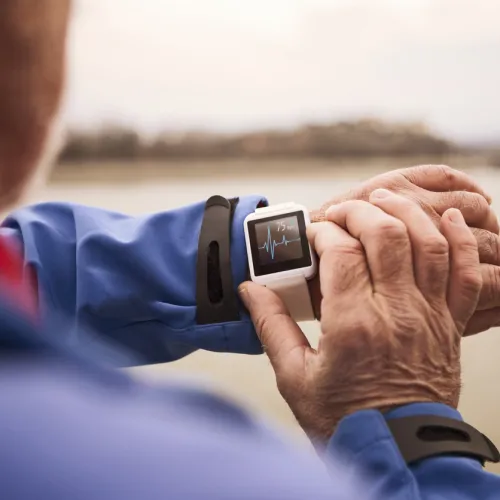Share
Like many digital natives, I believe that there are infinite places in society that can be improved by technology - inclusive of government and elections. But if there is anything that can sway that belief, it is the role that Bots have played in the US Presidential Election over the last year and a half.
The Good
My hope for the world is a group of friendly Bots making sure I get where I need to go in a caring, friendly way - complete Utopian! While I may have spent my last 19 months neck deep in election statistics and complex gerrymandering charts (we all do that, right? Right?), no everyone plans their month around when they want to vote, how they want to vote, and making sure they register to vote. Thankfully, there are bots with only one goal in mind: making sure that every eligible citizen votes.
Hello.Vote
/cdn0.vox-cdn.com/uploads/chorus_asset/file/7149671/004.png)
/cdn0.vox-cdn.com/uploads/chorus_asset/file/7149691/02.png)
Hello.Vote's one and only purpose is to register people to vote. Using either SMS by texting 384-387 or Facebook Messenger by typing m.me/hellovote into the to: field, the bot asks you for the following information: name, address, date of birth, citizenship status, and driver's license/Federal ID number, along with comfirming that you give them the permission to use your signature on file at the Department of Motor Vehicles. Within minutes, you're added into your state's Voter Registration Database and ready to vote!
The Bad
If Hello.Vote and the NYT Politics Bot are your friendly neighbours who watch your house while you're out of town, the Vote By Text Bot is the group of teenagers egging your house on Halloween; they're the ones pulling chairs from underneath you, filling your office full of Cheetos.
#VoteByText
The entire point of this bot is to convince people, using realistic ads, that you can vote in the presidential election by just using your phone (which is clearly not true).

Now, it's super illegal to do this (just like egging someone's house) but unless you catch them in the process, you're probably not going to get any justice done. The best you can hope for is the quick removal on Twitter as user report the tweets housing the misinformation - which is exactly what Twitter is trying to do.

The Straight Up Horrible
Called "Deplorabots" by The Next Web, there are three main trouble making Twitter users: trolls, bots, and cyborgs (humans that use algorithms that bots use). Generally, trolls encompass the last two categories. These cyborgs and bots are been incredibly active in one particular type of hate speech during this campaign: Anti-Semitism.
According to the Anti-Defamation League, between August 2015 and July 2016, 2.6 million tweets, with a combined 10 billion impressions, were posted, exponentially intensifying as soon as the election began. 50,000 journalists were targets with 10 Jewish journalists receiving 83% of the vitriol, including Ben Shapiro, Tablet’s Yair Rosenberg, the Atlantic’s Jeffrey Goldberg and The New York Times’ Jonathan Weisman, and CNN’s Sally Kohn and Jake Tapper. The majority of the tweets were sent by 1,600 Twitter accounts, comprised of 65% bots and cyborgs (over 1000 accounts).

The tweet above is of Jewish journalist Julia Ioffe's face imposed on a Holocaust victim's mug shot. These tweets are horrifying - and reminds me of the failed experiment by Microsoft to have humans interact with their AI, only to have it turn into a Nazi propaganda machine. I don't need tell you why this is straight up horrible but it stands as an example of what the Internet and bots are capable of doing.
Good, bad, or horrible, bots have completely changed the way that the Internet has influenced the election. As a data geek and with only mere moments until the President of the United States is elected, on November 9th, I plan on going through as much Twitter data as possible to see what correlations we can find between the results and the bots.


